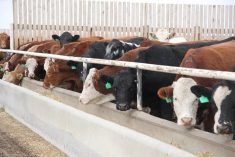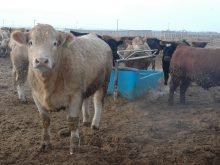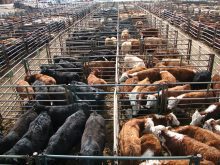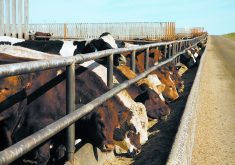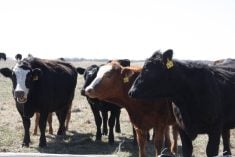This cattle market information is selected from the weekly report from Canfax, a division of the Canadian Cattlemen’s Association. More market information, analysis and statistics are available by becoming a Canfax subscriber by calling 403-275-5110 or at www.canfax.ca.
Fed cattle price steady
Alberta direct cattle sales saw light to moderate volume trade last week and average prices trending steady with the previous week. The majority of trade was reported dressed from $296-$298 per hundredweight delivered, steady to $1 per cwt. higher than the previous week.
Read Also

Why feds imposed EV tariffs
Moe and Kinew have a fight on their hands when it comes to eliminating the EV tariff. Canada has to worry about pissing off the U.S. and Mexico and hundreds of thousands of auto workers.
Weekly fed prices continued to firm contra-seasonally higher, and weighted average prices were the strongest reported since May 2017. Cattle priced last week were scheduled for the first half of September delivery.
Western Canadian fed slaughter for the week ending Aug. 6 increased two percent higher than the previous week to 43,781 head. Year to date, western fed slaughter was up two percent from a year ago, totalling 1.33 million head.
Canadian steer carcass weights surged six pounds larger than the previous week to 910 lb. and were 10 lb. larger than a year ago.
Canadian fed cattle/cow exports to the United States for the week ending July 30 were nine percent smaller than the previous week to 7,319 head and down seven percent compared with the same week last year. Year to date, fed cattle/cow exports were 22 percent larger at 286,579 head.
The Ontario cash market tone was generally steady with the previous week, with a handful of cattle trading at $306 per cwt. delivered. Sale volumes were too slight to establish a trend.
Fed prices typically bottom out in early September as seasonally reduced beef demand pressures cut-out values to second half lows. Continued large harvests and negative feeding margins this year have moderated carcass weights and continue to pull fed cattle forward.
In the U.S., live prices rallied US$3-$5 per cwt. higher than the previous week with trade from $139-$140 per cwt. in the south. Northern live trade was at a $5 per cwt. premium last week, with most sales reported from $144-$147 per cwt.
Cow prices rise
Butcher cows have traded higher for six consecutive weeks, gaining $8.50 per cwt., and prices are now at the highest point since 2015. D2s averaged $113.78 and D3s averaged $99.94 per cwt. Seasonally tighter non-fed supplies are being met with good buying interest from packers and feeder cow buyers. Over the past couple of weeks Alberta cow prices have been trading at a $5-$9 per cwt. premium against the U.S. market.
Butcher bull prices are trading about $4 per cwt. shy of their highs set back in early July. Butcher cow supplies are expected to gradually increase in coming weeks and more cow-calf pairs will be split at auction.
Even with historically large cow slaughter volumes in the U.S., 90 percent trim prices continue to trade near annual highs. According to the U.S. Department of Agriculture, in July U.S. retail ground beef prices were 11-12 percent higher than last year. Ground beef prices have risen at a much faster pace than steak and roast items, but consumer demand for ground beef continues to be strong.
Feeders gain ground
April/June 2023 live cattle contracts established new highs last week. In addition to stronger deferred live cattle contracts, western Canadian barley prices have been on a steady decline. This week barley prices for August-September delivery were reported around $360 per tonne delivered in southern Alberta, the lowest in more than a year. Ontario corn prices also fell sharply, averaging $305 per tonne.
Since the first half of July, Alberta feeder steers weighing more than 800 lb. have gained $16-$23 per cwt., while heifer prices over the same time have advanced $20-$30 per cwt. Last week, Alberta-Saskatchewan 950+ lb. steers for late August/early September delivery traded from $211-$220 per cwt., with a weighted average price of $215.40 per cwt. based at 1,015 lb.
Weekly Canadian feeder cattle exports to the U.S. totalled 3,320 head. For the end of July, this is the largest export volume since 2007. Based on the latest data, imports of U.S. feeder cattle for June totalled 11,444 head, down from 40,207 head last year. This is the smallest monthly import volume since March 2020.
In U.S. beef trade, cutouts ended the week down from last year, despite approaching the second half high. Choice cutouts were down three percent at US$263.10 per cwt., and Select cutouts were down three percent at $237.46.


